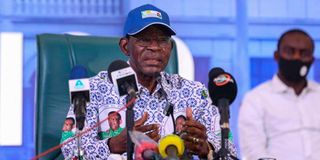Political elite has failed Africa

Teodoro Obiang Nguema Mbasogo, President of Equatorial Guinea and president of the Democratic Party of Equatorial Guinea (PDGE), speaks during a press conference at the congress hall in Bata, Equatorial Guinea, on November 25, 2021.
What you need to know:
- In fairness, few African countries are as bad as Equitorial Guinea.
- And there are countries that are genuinely well run. Ghana is a good example, Botswana is another.
Kenya will be 58 in a matter of days. In the last couple of days, I chanced upon an old 60 Minutes Australia report on YouTube about Equatorial Guinea. And the story of Equatorial Guinea, and its leader Theodore Obiang’ Nguema Mbasogo, has lessons about us and the problems we encounter developing our countries.
At the time of that report, the country was awash with petrodollars, having discovered huge deposits of oil. The US oil giant that was pumping that oil had stiffed the Equatorians, paying them only 11 per cent of the value of the oil, rather than the usual 60 per cent, if I heard well.
Mr Mbasogo was feted in the US, where he was received at convenings graced by American presidents all the while the corporate fat-cats grinning behind their hands at this insane, cruel and incompetent little man who was burning his country’s fortunes while his people suffered.
According to that report, there were two parts to Malabo, the capital city: An elegant sector with colonial, Spanish buildings, where the Mbasogos lived, and a huge slum without running water or sewerage and where the children did their studies at night under the street lights lining the road to the presidential quarter.
In the meantime, the country was pumping so much oil and – on paper – growing so fast that it was set to be the wealthiest country in the world in only 10 years. Ironically, by the fifth year of oil production when revenues were fully onstream, the country’s expenditure on health and education declined, that report said: The President and his family lived like kings, his people starved in abject poverty.
The President had 60 bank accounts in the Dupont Circle branch of Riggs Bank, a most soft-after address in Washington, where he kept the oil proceeds, 60 Minutes claimed. His son lived in the most expensive hotels in Paris, drove a Bentley, among other expensive cars, and could buy 30 expensive suits in one outing at an exclusive boutique.
Root of all corruption
His country’s ambassador accompanied him shopping, possibly to pick up the tab. He took out his Lamborgini, or was it the Ferrari, to go pick up some videos. In Washington, the father owned a mansion in a good part of the city, and another down the road. The son had a spread in Beverly Hills, California.
In the meantime, back at home, the country did not have an Olympic-sized swimming pool and its most famous swimmer, Eric Moussambani, posted the slowest 100m freestyle time in games history at the Sydney Olympics. He had trained in South Africa and Ghana.
It’s one of the best stories I have watched, old as it is, especially because of what it tells us about what’s wrong with our countries. In fairness, few African countries are as bad as Equatorial Guinea. There are examples of good effort all over the continent. Only a few months ago, Tanzania demonstrated great maturity after the loss of President John Magufuli and the somewhat smooth transfer of power to Vice President Samia Suluhu Hassan.
And there are countries that are genuinely well run. Ghana is a good example, Botswana is another. In many respects, Kenya also does very well, its problems notwithstanding.
However, 60 years after the season of independence, Africa struggles to get things moving. And a big part of that failure, is the inability of leaders to care for the people, rather than themselves. The root of all corruption is that leaders care more about themselves than they do about the people.
And some of them are not very clever. One imagines that with the amount of money flowing into some of these countries, it should be possible to steal and still develop the country and build a good life for all.
Strong recall legislation
I think the next years need some guardrails built around the elite to ensure that they don’t go off and take their countries with them.
For Kenya, I think we should build a game plan, perhaps a more specific Vision 2030 type long-term plan, which every successive regime will be committed to implementing and which focuses investment in areas where we have a competitive advantage, such as agriculture and tourism, and also mandates certain levels of investment in health and education. So every government is bound by certain expectations.
At the time, there should be performance expectations tied to very strong recall legislation. For example, every government should be expected to grow the economy at a certain pace and a regime that does not meet these standards is required not to seek re-election.
For Parliament, there can also be expectations for oversight and delivery of services. If this is not done, then the leadership of the institution is required to resign or not to seek renewal of term.
In other words, since we are doing such a bad job of overseeing our own government, it might be simpler to codify our expectations into laws and recall clauses so that non-performance and deviance is punished as a matter of course.
Happy birthday Kenya and enjoy your Jamhuri Day, but as you roast the meat, think about Theodore Obiang Nguema Mbasogo, the shocking limitations of the African elite and what we can do to keep our countries moving.





